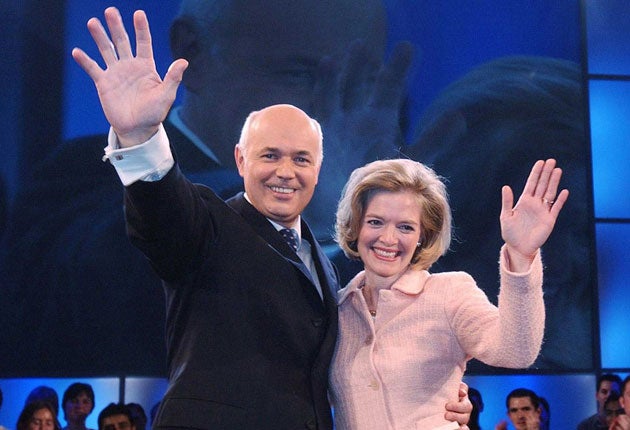The very British tradition of mid-term murder
For struggling leaders, conference season is a perilous time. By Ben Russell

It is the message from a string of political leaders ruthlessly ousted by their party: ignore the conference ovation, because within the month you could be gone.
As Gordon Brown prepares to face the Labour faithful in Manchester this weekend, the lessons of history show that even a flawless performance on the conference platform cannot stave off the wrath of a party that has lost faith.
When Margaret Thatcher addressed the 1990 Conservative conference in Bournemouth, delegates regaled the Iron Lady with chants of "Ten more years!"
Just over a month later she had been ousted.
Iain Duncan Smith orchestrated 17 standing ovations for his last conference speech, despite turmoil behind the scenes. As he declared that "the quiet man is here to stay and he's turning up the volume", Conservative Central Office's fixers in the crowd bounced to their feet to begin a rapturous but futile reception.
Tony Blair bestrode the conference stage to the end, but was forced to leave Number 10 early by a curry house putsch orchestrated by junior ministerial aides.
So how have a string of political leaders succumbed to a very British coup away from the ballot box? And what does their downfall say to Mr Brown?
Before Margaret Thatcher was thrown out of office in 1990, political orthodoxy dictated that a healthy prime minister with a reasonable majority was invulnerable. Anthony Eden stood down in 1957 on health grounds in the wake of Suez. But the plot to replace him started when he flew to Jamaica to recover from fevers.
Years later Mrs Thatcher was dealt a fatal blow by the resignation speech of former Chancellor Geoffrey Howe. He told MPs in the Commons: "The time has come for others to consider their own response to the tragic conflict of loyalties with which I have wrestled for perhaps too long."
The next day Michael Heseltine announced he would stand against her. Backing from her Cabinet evaporated as Mrs Thatcher's premiership entered its final hours. She declared she would fight on after winning the first round of the leadership ballot but failing to get enough votes for victory.
As her Cabinet colleagues answered the summons to see her in the hours that followed, it became clear the end had come. She wrote: "Almost to a man they used the same formula ... They themselves would back me, of course, but regretfully did not believe I could win."
The political assassination of Mr Duncan Smith in 2003 shows the power of MPs to topple a leader using formal procedures amid haemorrhaging support and the collapse of confidence in the Whips' Office.
The 2003 Conservative conference became a wave of plots in the Blackpool Winter Gardens, culminating in 25 MPs demanding a vote of confidence, fulfilling a rule that a leadership election could be called by 15 per cent of the party's MPs.
As for Tony Blair, he had long signalled his intention to stand down in the hope of keeping enemies at bay but fell victim to a plot over chicken vindaloo and saag paneer at a Wolverhampton Indian restaurant, when the then-junior defence minister Tom Watson discussed the leadership with MP Sion Simon. Mr Blair was hit by a wave of resignations as junior ministers and aides signed a letter urging him to name a date and go.
Mr Brown has suffered a call to arms from Charles Clarke, the former home secretary. The Prime Minister has suffered resignations from the Government this week, and while Cabinet ministers have held back from telling him to call it a day, their public expressions of support have been qualified. The unease at Tuesday's "excruciating", bad-tempered political cabinet meeting may show their patience is about to snap.
Rebel Labour MPs seeking to remove Mr Brown would need 70 Labour MPs to back an alternative candidate to trigger a contest, a hurdle they cannot yet clear. But as the Prime Minister delivers his speech next week, he will know the end can be brutal and swift.
Subscribe to Independent Premium to bookmark this article
Want to bookmark your favourite articles and stories to read or reference later? Start your Independent Premium subscription today.

Join our commenting forum
Join thought-provoking conversations, follow other Independent readers and see their replies